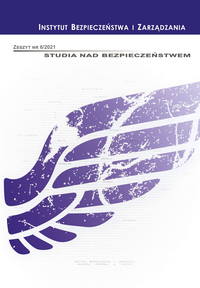Abstrakt
W artykule przedstawiono wpływ wojskowej kultury organizacyjnej na indywi dualne wyniki uczniów. Przedmiotem artykułu jest identyfikacja niektórych elementów woj skowej kultury organizacyjnej, które wpływają na indywidualne wyniki w procesie szkolenia, co jest szczególnie związane z motywacją do szkolenia i działalności wojskowej. Szczególnym przedmiotem badań empirycznych są stażyści w dziedzinie nauk wojskowych, specjalizujący się w organizacji i zarządzaniu jednostkami wojskowymi na poziomie taktycznym w Narodo wym Uniwersytecie Wojskowym w Bułgarii.
Bibliografia
Atanasova-Krasteva N., Leadership Establishment of Cadets, Publishing complex of Vasil Levski National Military University, Veliko Tarnovo 2012.
Atanasova-Krasteva N., Some Theories and Views on Leadership, “Annual University Confe rence National Military University”, Publishing complex of Vasil Levski National Military University, Veliko Tarnovo 2011.
Ćwik B., The Concept of Threat Model in the Aspect of Safety in Logistic Systems, “Systemy Logistyczne Wojsk” 2017, nr 47, Wydawnictwo WAT.
Doncheva J., Principles of training in line with the new thinking and action, SEA – Conf., 3 International Conference, Naval Academy, Constanta 2017, No 3, ISSN 2457-144X. Hofstede G., Culture’s Consequences: International Differences in Work Related Values, Beverly Hills, CA, Sage Publications 1980.
Johnson, G., Rethinking Incrementalism, “Strategic Management Journal” 1988, Vol 9.
Manolov D., Possibilities of the situational approach in the training in security logistics, Con ference proceedings of the Annual University Scientific Conference of the Vasil Levski National Military University, Veliko Tarnovo 2016.
Sotirov D., Stoyanov Y., A Methodology for Evaluation of the Quality of Education in the Specialties at the Vasil Levski National Military University, Scientific Papers from the Scientific Conference at the Vasil Levski National Military University – The Bulgarian Way to NATO – Perspectives and Challenges, 2003, vol. II, Publishing complex of Vasil Levski National Military University, VT, ISSN 0861-0312.
Stefanescu R., Change oriented leadership, “Revew of General Management” 2008, issue no.1, edited by Spiru Haret University, Faculty of Management, Brasov, Romania, ISSN 1841 -818X.
Stefanescu R., Power and its key role in leadership, “Metalurgia International Review” 2010, special issue no 4, Scientifing Editing house F.M.R., Bucharest, Romania, ISSN 1582 2214.
Stoyanova S., Group Management, University Publishing House St. Cyril and Methodius, VT, 2013.
Stoyanova S., Groups – Dynamics and Risks, A & B, VT, 2013.
Stoykov S., Marinov R., A comprehensive approach to education and management in the sy stem of security, International conference Knowledge-based organization-Land Forces Academy, ‘Nicolae Balcescu’, Volume 24: Issue 1, Sibiu-Romania 2018, ISSN 1843 682X.
Stoykov S., Scientific knowledge – source of a competitive advantage in security, International conference on High Technology for Sustainable Development HiTECH 2018, ISBN: 978 1-5386-7039-2.
Świerszcz K., Bezpieczeństwo państwa w czasach współczesnych w ujęciu podmiotowo-aksjo logicznych wyzwań, “Przegląd Nauk o Obronności” 2016, WAT, nr 1–2.
Tsvetkov D., Lectures on Statistical Methods in Psychology, IVIS, Veliko Tarnovo 2015, ISBN 978-619-205-003-0.
Tsvetkov D., Statistical Methods in Psychology, Collection of Reports – May Readings, Pub lisher: Union of Bulgarian Scientists, Veliko Tarnovo 2008.

Utwór dostępny jest na licencji Creative Commons Uznanie autorstwa 4.0 Międzynarodowe.
Copyright (c) 2021 Array

